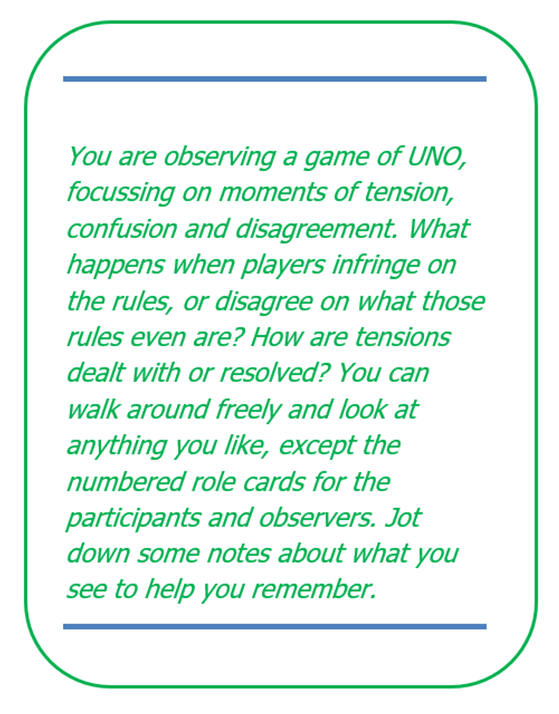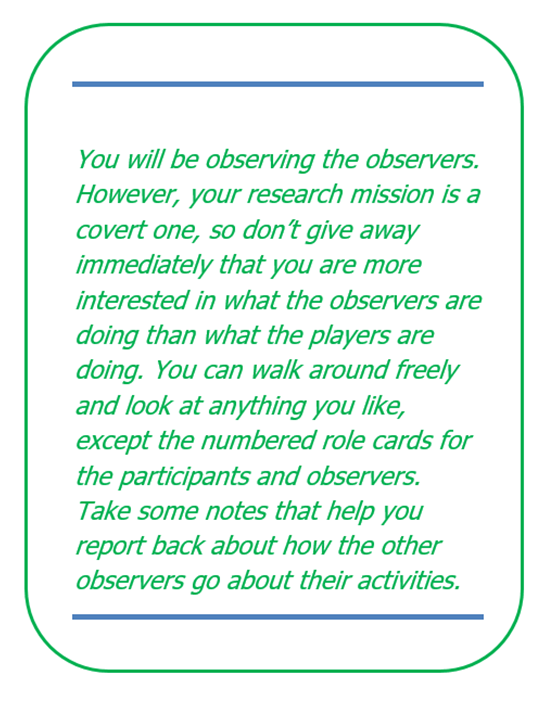
By Alexandra Supper, Department of Society Studies, Maastricht University, the Netherlands.
In this resource post, I share an exercise I developed to practice participant observation skills with undergraduate students new to the ethnographic method. Looking for a playful and non-intimidating way of giving students a first opportunity to engage in ethnographic research during class and build some skills and competence before heading out into the field, I decided to use Uno, chosen for its simplicity and widespread familiarity. To make the observation of an Uno game interesting, I introduced tensions through a set of role cards.
In this post, I give an overview of how I set up the activity to practice observational skills. For a more detailed explanation, covering the underlying rationale, the intended take-away messages and the experiences and adaptations made over the years, do check out my full Developing Teaching Report: Observing Uno: Practicing participant observation through a card game (available open access)
Activity: Observing Uno
Target group: groups of 8-16 undergraduate students (or other novice ethnographers)
Time required: 1-2 hours
Materials needed: a set of Uno cards and self-printed role cards (see below); pens and paper for the observers
At the beginning of the session, between three and six students are designated as observers, who are each handed a role card that should be kept secret from all other students. Three different observer roles are included in the activity, each of which should be assigned to at least one student:



Image 1: role cards for Participant 1 and 2, which are repeated depending on number of players
The remaining students are designated as players/participants. Ideally, these students should be familiar with Uno, or otherwise be confident in their ability to learn a simple card game quickly. If they are familiar with the game, it is not necessary to give instructions about the rules; the process of negotiating between different house rules can be part of the observational exercise. All participants are dealt a secret role card, ensuring a roughly even split.


Images: role cards for Participant 1 and 2, which are repeated depending on number of players
The instructor then deals the cards and the game begins. Since the length of a game of Uno is unpredictable, it can be cut short by dealing less cards or by declaring it a tie after about 15 minutes – by then, the Observers should have collected enough material to prepare a short report about what they have witnessed. As long as everyone remains civil and peaceful, there should be no need to interfere in the dynamics of the game; it does not matter if students actually adhere to the instructions they received. Indeed, the fact that different groups will deal differently with the tensions that can emerge between silence and boisterousness or between different rule interpretations makes the exercise all the more interesting.
After they have stopped playing, give students at least a few minutes to go over their jottings and prepare a short report about what they have observed. In the meantime, those students who have so far been playing cards can write up a short report describing the physical setting and atmosphere of the activity. Then, the students report back, starting with the players, followed by Observer 1, then Observer 2, then Observer 3 (with the remaining observers chiming in with additions). The instructor can ask follow-up questions and probe for details along the way to gently guide them towards richer observations. Finally, do take some time to collectively reflect on what students have learned and how they can set these skills into practice when doing participant observation research outside of the classroom.
I hope you have found this resource useful! In case you end up adopting or adapting this technique for your own classes or workshops, or want to share experiences with other playful ways of practicing ethnographic skills, please do not hesitate to contact me at a.supper@maastrichtuniversity.nl
I have added the role card templates for download.
To read more about using games in teaching, see this Blog post by Patrick Bijsmans and Anna Harris, where I first presented my Uno adaption.
My original Developing Teaching article can be found here: Observing Uno: Practicing participant observation through a card game
*Uno header image shared with permission from Patrick Bijsmans and Anna Harris.

Leave a Reply
You must be logged in to post a comment.